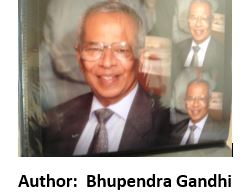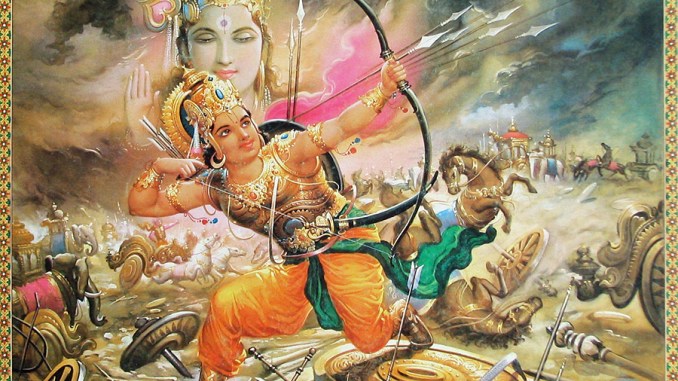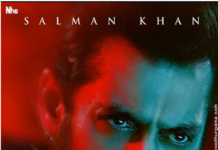Since the serialization of HINDU religion’s epic poem MAHABHARAT in 97 episodes by various TV channels, including BBC, it has aroused immense interest among Hindus and also among indigenous, intellectual people of Britain.
 Even after the series was over a long time ago, numerous other plays and serials were and are still bring produced in Europe as well as in America and in fact throughout the world. The Mahabharata has just been published in China, in the Chinese language, an atheist, Communist country where religious places are routinely destroyed, where religion has no place in public life, although it is a staunch Buddhist nation in many ways.
Even after the series was over a long time ago, numerous other plays and serials were and are still bring produced in Europe as well as in America and in fact throughout the world. The Mahabharata has just been published in China, in the Chinese language, an atheist, Communist country where religious places are routinely destroyed, where religion has no place in public life, although it is a staunch Buddhist nation in many ways.
The first edition was sold out within weeks in China and the second edition is already due to come to shops before Christmas. It seems Chinese people are now looking to India and Hinduism to reignite their cultural and religious awareness.
It is interesting to know how the Western world tries to explain about the civilization that may be a thousand years ahead of our present day achievement, our advancement in this day and age but not able to establish a base on the Moon.
The following paragraph is from the “Unexplained World Mysteries” by Pam Beasant and published by Collins.
“The Mahabharat is a long Indian poem, written during the second centaury AD. In it, there are many accounts of battles which seem to contain references to weapons and equipment which were not invented until the 20th Century. The hero, Lord Krishna, for instance, uses arrows that behave like anti-ballistic missiles. Lord Krishna also kills his enemies with what sounds like “Smart Bomb”, which seeks out its target, using sound waves. Some of these equipments are so futuristic that they are still to be invented.
The most frightening part of the poem seems to describe so accurately the effects of a nuclear explosion. It tells how the hero Ghaloth Katch threw missiles against three cities, from his flying machine. It contained all the power of the universe and rose up in a single column after exploding, destroying everything in the cities.
The poem further describes what sounds like the after effects of a nuclear radiation. Hair and nail fell out, food was contaminated and people threw themselves into the water to try to wash off the poison. The accuracy of this description makes people believe that the poet had a vision of terrible weapons we possess today.”
Well, how could anyone describe so accurately the advance of science in ten thousand years’ time, unless it was the description of the war that took place some fifty thousand years ago and the knowledge was passed on, from generation to generation, until it was recorded in a poem form?
Could it be difficult for the Christian European nations to accept the existence of a Hindu, Asian civilization with such an advance technology, which even to-day the West is unable to match?
Such an advanced scientific capability defies logical explanation. Could it be possible that a “Star War” type third world war completely destroyed such an advance civilization, leaving only the pocket of human existence which had to start from scratch and it took some ten to fifty thousand years to advance to where we are to-day?
The word Baan (arrow) is very similar to word bomb. Could to-day’s weapons be the legacy of the past? Could Agni Baan be atom bomb and Varsha Baan a rain bomb not yet invented, used to clear the atmosphere of the radiation fall out? What about the Baan that darkens the sky and plunges the day into perpetual darkness, lasting indefinitely?
Could it be earthquake, a volcanic bomb which releases dust particles on a massive scale, obstructing the sunlight and plunging the earth into perpetual darkness, destroying practically every living thing except those people who were fortunate enough to take shelter in a nuclear bunker? Could the caves of Ajanta and Elora and many more found in Mount Abu, Himalayas and the Mountains of Western Ghats be such nuclear shelters, later on converted into work of arts by the people trapped in them?
Well, such an explosion, comparable to the war of Mahabharata occurred some thirty million years ago, when a large comet collided with earth, releasing billions of dust particles and leaving earth in complete darkness, for hundreds of years, bringing ice age and destroying all living things, including DINOSAURS ?
At least that is the explanation put forward by the scientists, for the disappearance of dinosaurs who once monopolised the world. Some of the weapons used in the war of Mahabharata are not even on the drawing board to-day. What about the Naglock, a civilization that build their cities under the sea? Could it be a foresight, to avoid being annihilated by a nuclear war?
What type of an advance technology one would need to build a city beneath the sea? The capital city of Lord Krishna has been found on the seabed, in the Gulf of Cambay. Was it submerged under the sea or was it deliberately built by Lord Krishna on the seabed, as he foresaw such a conflict, a nuclear holocaust that would destroy the great civilization?
Could civilization of Mahabharata be a couple of thousand years ahead of us? Even inter planetary travel is mentioned in the poem of Mahabharata.
When the war was over, Pandavas were so devastated physically, mentally and morally, at the destruction of unimaginable proportion to their cities and the tragic loss of lives of the people they loved and admired most, including the father of the nation and a grandfather like figure of Bhisma Pitamaha, their noble elder brother Lord Karna, their teacher, Guru Dronacharya who taught them everything they knew about weaponry and all their children except one, that there was no joy in their victory, only a relief that truth had triumphed over evil.
The five brothers left everything behind and went to the highest peak in the Himalayas and left this earth for a while may be until the radiation was washed away from the atmosphere? Could it be a space travel?
Ironically Lord Krishna, their best friend, their Guru, their inspiration, remained behind, perhaps in the underwater city of Dwarka, a foresight on the part of Lord Krishna to build such a city for such an eventuality?
It is the fervent wish of the American theme park industry, to create an illusory palace to match the one built by Pandavas in their capital city Indraprasth. A visit to this magic palace by Duryodhan was the cause of the greatest conflict ever recorded in the annals of the human history.
In this illusory palace, full of laser effects, the evil Duryodhan, walked straight into a swimming pool, imagining it to be a beautifully designed marble floor and then lifted his dhoti (trouser) to walk on a marble floor believing it to be a shallow lake.
This gave rise to the famous phrase, Andha Ka Beta Andha and planted the seeds of the battle to come. The entire account of this eighteen day war, was narrated by Sanjay, to the sightless king Dhruthrashtra, in his own palace, watching the whole episode on TV perhaps?
The most advanced and amazing weapon used in this war, was the Sudershan Chakra, a Lord Krishna’s favourite weapon. Could it be today’s Tomahawk Cruise missiles so devastatingly used by USA in Gulf, Serbian and Afghan war?
The Tomahawk cruise missile is the most spectacular and technically advanced weapon ever used in a war. It’s highly complicated radar and guidance system can be accurate to within a few yards, over fifteen hundred miles range, fired even from a submarine, while submerged some one thousand feet under sea water.
The missile hugs the ground as it flies, searching it’s way from the Digital Terrain Maps, 3-D pictures showing every contour, with satellite plotting every hill, every tall building and street corners.
The missile is so accurate that it could be fired from the island of Malta, in the Mediterranean Sea and make it land in the fountain at Trafalgar square, avoiding all the high rise buildings. Could Sudershan Chakra be tomorrow’s Cruise missile, even more advanced and sophisticated, yet a fraction in size, seeking out not only military targets but human beings as well which was used to target some villains who were fleeing the battlefield after committing atrocities, breaking the code of conduct normally used, respected by all parties? Such a weapon we may not be capable of developing for another few hundred years or so?
The Western countries could not be convinced about such an advanced Eastern Hindu civilization, without any physical evidence. But as we have often experienced, truth is stranger than fiction, as the recent events have proved.
May be we should seek the evidence in the ruins of Japanese cities of Nagasaki and Hiroshima. Could anything survive an attack, a million times more destructive than the atom bombs dropped on these Japanese cities?
Only a very few and privileged people, in isolated pockets, perhaps in underground bunkers, may have survived this Maha-Sangram, to pass down the details of this stranger than fiction storey of Maha-Sangram, the mother of all battles, the “Battle of Mahabharata.”
Every Asian of whatever nationality and religious affiliation should take pride in the storey of Ramayana and Mahabharata that such an advanced civilization existed in Asia, some ten to fifty thousand years before the birth of the Holy Child Jesus Christ, who gave us Christianity, one of the noblest religions to emerge since Buddhism.

Readers like you, make ESHADOOT work possible. We need your support to deliver quality and positive news about India and Indian diaspora - and to keep it open for everyone. Your support is essential to continue our efforts. Every contribution, however big or small, is so valuable for our future.












This is a great article and evokes more questions than answers however some of the date lines quoted need to be verified. Sadly succession of rulers and colonisers of India were unable to keep accurate record or explore archaeologically various places referred to in the great legend. In fact it looks as if before the theme park industry treats this as mere gimmick there should in fact be University led studies into the historical facts of the weaponry, battle locations and anything which brings a modern perspective to this epic tale